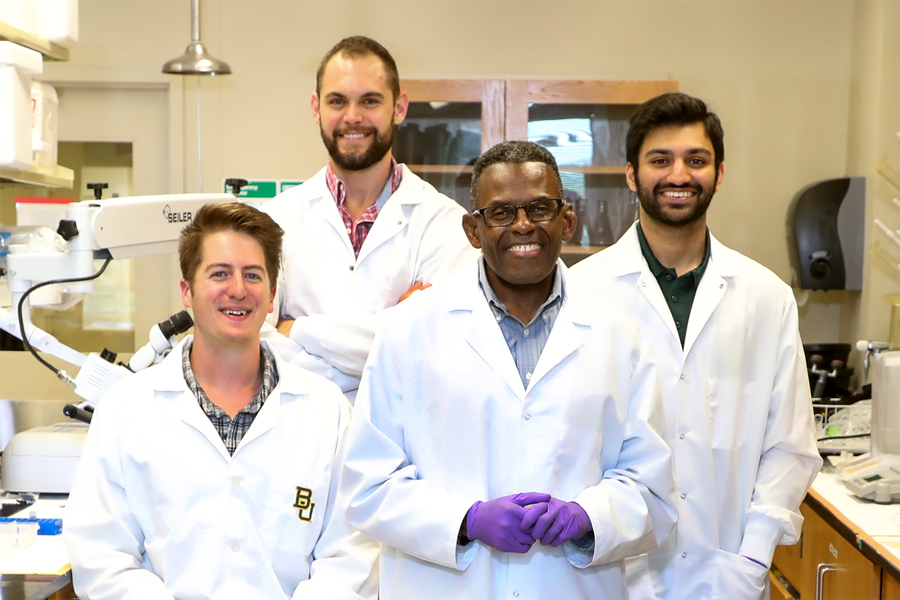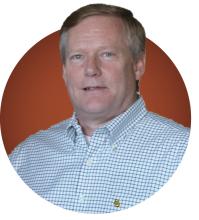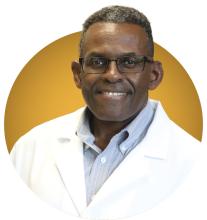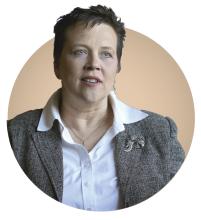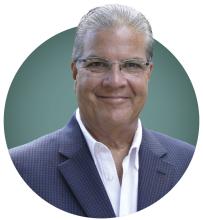Quest for the Best
Endowed faculty positions are helping Baylor in its quest to build its national research profile.
As the morning light seeps through the blinds of the laboratory windows in the east wing on the second floor of the Baylor Sciences Building, undergraduate students, graduate students and postdoctoral researchers are filtering in. Slowly, the sounds of whirring electronics and gurgling solutions inside solvent flasks coalesce into a melodic din of scientific discovery.
These are the everyday sounds of Baylor University’s synthetic organic chemistry laboratory. Here, students are exploring how to put molecules together, controlling where the atoms are positioned in three-dimensional space. As the final students are assembled, the person who oversees all this activity arrives in the lab —
Dr. John Wood, the Robert A. Welch Distinguished Professor of Chemistry and Biochemistry at Baylor. Wood is one of several prestigious faculty members who hold endowed chairs and professorships in the College of Arts & Sciences.
Baylor has made public its quest to achieve R1 status — which means joining the 131 top-tier universities and colleges nationwide now classified in the Carnegie Classification of Institutions of Higher Educations as “doctoral universities with very high research activity.” In this quest for Carnegie’s highest research classification, adding and cultivating the talents of endowed professorships at Baylor such as the one held by Dr. Wood is a key factor.
What are endowed chairs?
At the most basic level, an endowed faculty chair or professorship is a faculty position supported by the earnings from an endowed fund donated to the University, instead of by funds from the University’s general budget. The annual interest from this endowed fund not only pays the professor’s salary, but funds the facilities, supplies and supporting personnel needed to advance that professor’s research.
Competition among universities for the elite faculty scholars and researchers who are called upon to fill endowed chairs is fierce. Universities must demonstrate that they have the funding and resources to support costly research, as well as to employ the junior faculty, postdoctoral researchers and graduate student scholarships that a top faculty member will want to see before relocating his or her laboratory and research enterprise to a new institution.
“The distinguished faculty that these endowed positions allow us to recruit are one of several core reasons we continue to see Baylor and the College soar to new heights year after year, and we are grateful for the Baylor alumni and friends who have given generously to attract these elite scholars and researchers to the University.”Dr. Lee Nordt
To help provide the financial resources needed to increase its roster of endowed chairs and professorships, the University is bolstered by the Baylor Academic Challenge — a matching funds initiative, funded by an anonymous donor, designed to increase the number of named, endowed faculty positions that will advance the priorities of the University’s strategic plan, Illuminate.
At present, Baylor’s College of Arts & Sciences has more than 20 endowed chairs and professorships — fairly evenly divided between the sciences and the humanities (see chart here). These positions allow the College the flexibility to fund investments in top personnel with international reputations, as well as provide the prestige and renown inherent in these coveted faculty positions.
An Impact Deep and Wide
Dr. Lee Nordt, dean of the College of Arts & Sciences, said that the Baylor Academic Challenge is evidence of the emphasis the University and the College place on endowed positions and the contributions their holders can make to society.
“The impact that these experienced educators in leadership positions can have at Baylor and beyond cannot be understated,” Nordt said. “The distinguished faculty that these endowed positions allow us to recruit are one of several core reasons we continue to see Baylor and the College soar to new heights year after year, and we are grateful for the Baylor alumni and friends who have given generously to attract these elite scholars and researchers to the University.”
Besides enhancing academic achievements within the College of Arts & Sciences and Baylor’s 11 other academic units, endowed faculty positions can provide additional support to departments across the University and serve as catalysts for growth in areas of strong student interest. Baylor’s provost, Dr. Nancy Brickhouse, believes that endowed positions also help the University explore new avenues of research significantly faster than what would be possible without such donor support.
“The acceleration and plurality of research thanks to the generosity of our donors who fund these positions will continue to be vital to achieving Baylor’s long-term goals,” Brickhouse said. “Recruiting strong research-oriented professors to fill endowed chairs will have a hugely positive effect on the experience of students at every level of education.”
Brickhouse said that endowed faculty positions are a “non-negotiable imperative” in Baylor’s drive to achieve Tier 1/Research 1 status.
“These positions are a major University priority for a bevy of reasons — chief among them are the opportunities that these kinds of faculty hires can present for students as well as the entire University population,” she said.
Dr. John Wood
Dr. John Wood has become one of Baylor’s most accomplished endowed faculty members. He arrived at the University in 2013 after serving at Colorado State University for six years as the Albert Meyers Professor of Chemistry, and before that at Yale University as a professor of chemistry for 13 years. Prior to his teaching positions, Wood completed postdoctoral work at Harvard University.
As the Robert A. Welch Distinguished Professor of Chemistry in the College of Arts & Sciences, Wood brings to bear more than just his many years of experience and expertise as a chemist and educator. He carries with him an international network of colleagues and connections as well as an impressive scholarly reputation — all of which enriches the mentoring, training and instruction he imparts to his students.
Approximately two-thirds of the students working in Wood’s laboratory will eventually enter the pharmaceutical industry or adjacent professions, where they will develop new drugs for the treatment of a variety of different diseases using skills acquired at Baylor. The remaining third of Wood’s students will go into academic positions, where they will do research in the same or similar vein as their professor.
“I’m in the business of educating students in how to look at a molecule and design an approach that can be used to prepare it in the lab, but I’m also interested in my students — hearing their day-to-day problems and helping them solve their research questions,” Wood said.
“In my lab, every student and postdoctoral researcher is working on synthesizing a different molecule. My approach is to field questions and avoid telling them exactly what to do or what to research.”Dr. John Wood
On a typical laboratory-focused day, one when Wood isn’t teaching in a classroom, he will walk through his laboratory and stop to speak with every student, finding out what they have planned for the day and answering any questions they might have.
“In my lab, every student and postdoctoral researcher is working on synthesizing a different molecule. My approach is to engage my students as a consultant, and field questions but to avoid telling them exactly what to do or what to research,” Wood said. “My goal is to train people to do that creative and critical thinking for themselves.”
In addition to the value Wood brings to Baylor as a researcher and educator, the work done in his laboratory has a significant impact on students’ trajectories after they leave the University. This is the potential exponential growth through connections that an endowed chair can create for their department. When leveraged to its greatest potential, an endowed chair can simultaneously increase the standing of the institution while also fostering advocates outside the University in both industry and the academy.
Dr. Dwayne Simmons
The research and scholarship produced by Baylor faculty in endowed positions and the learning experiences they provide for their students help to display the high caliber of research and instruction taking place at Baylor, and serves to propel the University toward an even more successful future. This beneficial relationship between endowed faculty positions and the University is evidenced in the work of Dr. Dwayne Simmons, the chair of Baylor’s biology department, who serves as the Cornelia Marschall Smith Endowed Professor.
An internationally recognized researcher, Simmons received his PhD from Harvard and came to Baylor after serving as a professor in the Department of Integrative Biology and Physiology at UCLA, where he directed several undergraduate research programs funded by the National Institutes of Health.
In his research, Simmons studies how sensory cells and neurons in the brain respond to aging. Passionate about the value of research, he has helped Baylor grow programs in the research of cancer, sensory biology, the microbiome, neglected tropical diseases and more.
In addition, Simmons has shown his commitment to research across all levels of education through the formation of the Baylor Transdisciplinary Undergraduate Experience, a hands-on summer research program for undergraduate students.
“As I got a chance to get familiar with Baylor after I was first contacted about the possibility of joining the Baylor Family, I was intrigued by the idea of a Christian institution that's aspiring to be a top-notch, Tier 1 research university and attempting to do something that very few Christian institutions have ever done before.” Simmons said. “I was drawn to Baylor because it offered me the ability to set up my research lab on campus in Waco, do the research that I was doing at UCLA, and help attract top-notch Christian faculty to this institution who can build our reputation and the research base so that we are at the table of top-tier research institutions in this country and the world.”
Dr. Lauren Barron
Another Baylor faculty member whose impact on the University and her field is expanding through a donor-funded position is Dr. Lauren Barron, who has begun serving as the inaugural Michael E. DeBakey, MD, Selma DeBakey and Lois DeBakey Chair for Medical Humanities in the College of Arts & Sciences. Barron directs Baylor’s medical humanities program, which is an undergraduate interdisciplinary program for students who desire careers in healthcare, but want a rich exposure to the humanities in addition to gaining an outstanding foundation in the sciences.
A medical doctor who initially returned to Waco after medical school to serve at Waco Family Medicine, Barron went on to join a private family practice and serve as medical director for Hillcrest Community Hospice. She began teaching courses in Baylor’s medical humanities program and was eventually tapped as its full-time director.
Barron brings a unique perspective to medical humanities students because of her knowledge and experience as a medical doctor and her ongoing practice of medicine through Waco Family Medicine — both of which complement her teaching in the classroom.
“The tremendous growth in the number of students we have in medical humanities indicates the growing interest in the program at Baylor. It’s not uncommon for our students to tell me they selected Baylor because the medical humanities program is so distinctive,” Barron said.
According to Barron, the new endowed DeBakey Chair will enable the medical humanities program to have additional faculty and hopefully allow those faculty members to produce more scholarship for publication.
“The DeBakey Chair is also going to enhance the national and international prominence of the medical humanities program, and hopefully make it even more attractive for our colleagues all across the University to collaborate with us,” Barron said. “Having such a prestigious chair also reinforces the commitment that Baylor University has toward the health professions and research connected with health and medicine that are part of Baylor’s goals.”
Dr. Carlos Cardoza-Orlandi
Dr. Carlos Cardoza-Orlandi serves as Baylor’s Frederick E. Roach Professor of World Christianity in the Department of Religion. An interdisciplinary scholar and historian in the fields of world Christianity and mission studies, his research interests include interpretations of the Christian movement around the world on both institutional and popular levels, the socio-cultural interplay between Christians and people of other faiths, and more.
Cardoza-Orlandi joined the Baylor faculty in 2018 after eight years teaching at Southern Methodist University, and he said one thing that drew him to Waco was Baylor’s religion department.
“I’ve got colleagues who have a deep heart for teaching, and they also have great minds and they’re doing amazing research,” he said. “To be part of a department that actually is able to integrate teaching and top-notch research is very exciting.”
Another thing that drew Cardoza-Orlandi to Baylor was the chance to take advantage of what he calls an “interesting opportunity,” thanks in part to the resources provided through the Frederick E. Roach Professorship and the religion department.
“As a Christian university, with so many sociologists, anthropologists, historians (and) religious scholars that are committed to the Christian religion…we can really create something,” he said. “We are in the process of creating a new way of understanding the history and role of the Christian religion with an emphasis in the world Christian movement, and an emphasis in the way in which Christianity throughout its history is actually a world religion.”
As he tracks the spread of Christianity throughout the world in his research, Cardoza-Orlandi has found that the vitality and growth of Christianity today is no longer centered in the old, traditional centers of the faith in the Western world.
“The new centers [of Christianity] are to be found in Sub-Saharan Africa, in Latin America, in Asia and in the Pacific,” he said. “As Christianity has moved towards the global South, it’s taking its own agency, it’s taking its own taste, it’s taking its own rhythms in a way that actually provide windows and opportunities to see the Christian religion with a new perspective, with an understanding of new agents of the Christian faith, particularly traditional poor women of color.”
